Battling Addictions
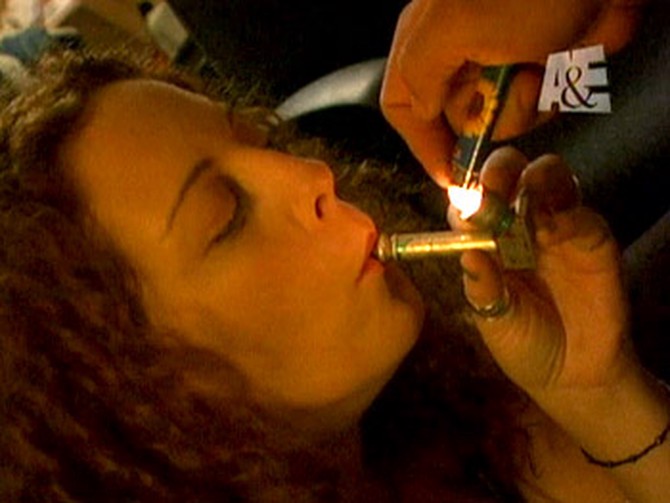
Alyson's family says she was smart and ambitious when she was young. She attended a prestigious university and held an internship at the White House, even getting invited back for a second summer. But that's not how Alyson described herself on Intervention, a controversial show on A&E. "I am 27 years old," she says. "I wish I could say I am a lawyer, or I am an actress. But I can't. I am a drug addict. That comes first before anything." Alyson is addicted to both crack and opiates. The cameras from Intervention followed Alyson for several days, filming her buying and smoking crack, and even stealing morphine from her dying father's bedside.
Alyson was truly struggling with her addictions. Her relationship with her family, particularly with her mother and sister, Kara, were especially frayed. "I wonder what I did wrong with my life," Alyson says. "There's so much I did wrong and I can never take it back, ever. It's going to haunt me until the day I die." Despite her regret, Alyson was completely unable to gain control of her life.
Alyson's family, believing that they had just one more chance to get her straight, asked substance abuse addiction specialist Jeff VanVonderen to help them conduct an intervention.
Alyson was truly struggling with her addictions. Her relationship with her family, particularly with her mother and sister, Kara, were especially frayed. "I wonder what I did wrong with my life," Alyson says. "There's so much I did wrong and I can never take it back, ever. It's going to haunt me until the day I die." Despite her regret, Alyson was completely unable to gain control of her life.
Alyson's family, believing that they had just one more chance to get her straight, asked substance abuse addiction specialist Jeff VanVonderen to help them conduct an intervention.
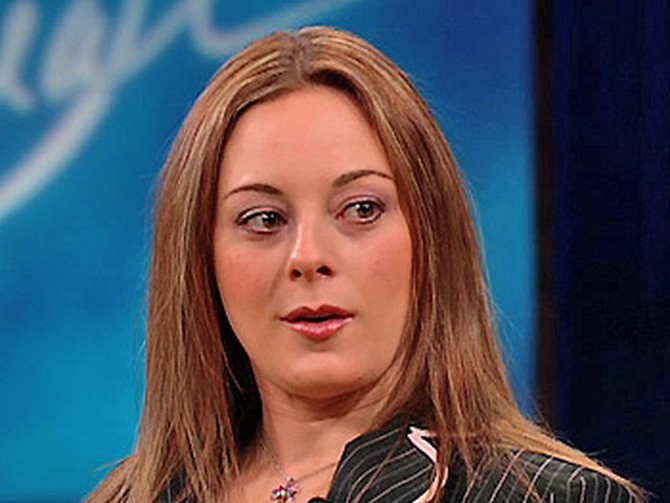
When confronted by her family, Alyson immediately agreed to enter rehabilitation. Nine months after entering rehab, Alyson says she has remained clean. "I was ready to get help," Alyson says. "I had been calling out for help for quite some time. I just needed someone to kind of push me in that direction."
Her rehab was a torturous experience, and she vomited "nonstop" for a week and a half. "Crack, opiates, barbiturates, basically everything under the sun, I was doing. So my body was pretty toxified."
After undergoing nine months of rehab, Alyson says sobriety is "scary, and sometimes it hurts and sometimes it doesn't. I'm happy for the first time, really happy, and it feels real."
She says, starkly, that the experience of the intervention saved her life. "I don't think I would be here today [without it]. I really don't," she says. "I hadn't had anything else in my body for so long I couldn't even stand up in the shower for very long. I was just trembling everywhere I went."
Her rehab was a torturous experience, and she vomited "nonstop" for a week and a half. "Crack, opiates, barbiturates, basically everything under the sun, I was doing. So my body was pretty toxified."
After undergoing nine months of rehab, Alyson says sobriety is "scary, and sometimes it hurts and sometimes it doesn't. I'm happy for the first time, really happy, and it feels real."
She says, starkly, that the experience of the intervention saved her life. "I don't think I would be here today [without it]. I really don't," she says. "I hadn't had anything else in my body for so long I couldn't even stand up in the shower for very long. I was just trembling everywhere I went."
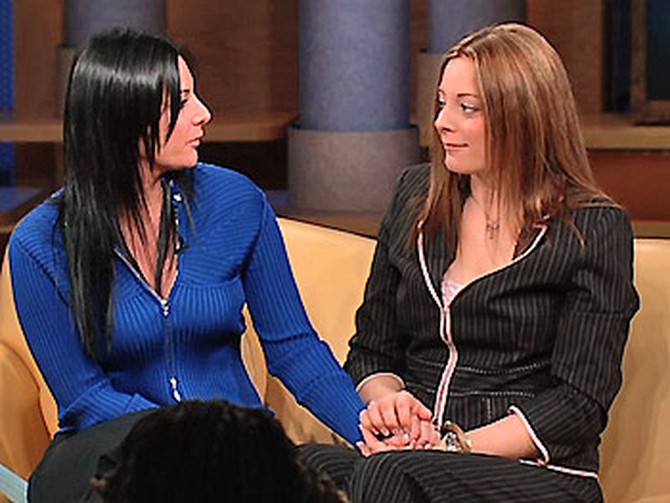
When Alyson was high, she often would lash out at her sister, Kara. They would often fight, and at one point Kara said, "I dread the fact knowing my sister's [at home]. You just never know what to expect. What drama I may be walking into."
But mostly Kara said she felt sadness about Alyson's addictions. "She could have been something so wonderful in life and she just threw it away," Kara said.
Now, however, Alyson is out of rehab and is seeing Kara for the first time since the intervention. Kara says she's proud of her sister's accomplishment in getting sober, and says she has hopes that they can reestablish a loving relationship. "I think it is possible as long as she stays on this path that she is on," Kara says. "She's a very beautiful human being. She just found another way to cope with life for some reason."
But mostly Kara said she felt sadness about Alyson's addictions. "She could have been something so wonderful in life and she just threw it away," Kara said.
Now, however, Alyson is out of rehab and is seeing Kara for the first time since the intervention. Kara says she's proud of her sister's accomplishment in getting sober, and says she has hopes that they can reestablish a loving relationship. "I think it is possible as long as she stays on this path that she is on," Kara says. "She's a very beautiful human being. She just found another way to cope with life for some reason."
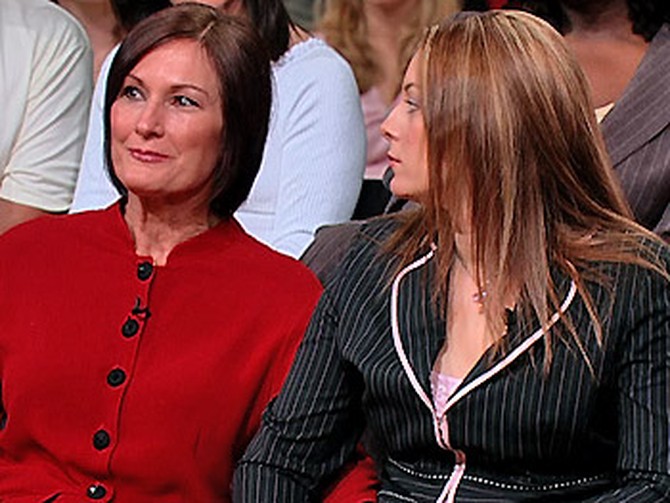
Alyson's mother, Patricia, says that living with her addicted daughter was sometimes quite scary. "I was deathly afraid of her," she says. "We had called the police on several occasions to have her taken away because we couldn't control her. She'd emotionally attack me, physically attack her father, try to throw Kara down the stairs. It was just too much."
This violence had escalated so much, Patricia says, that the family sought help from Intervention. "That was at the end," she says. "That's when we started trying to get help."
This violence had escalated so much, Patricia says, that the family sought help from Intervention. "That was at the end," she says. "That's when we started trying to get help."
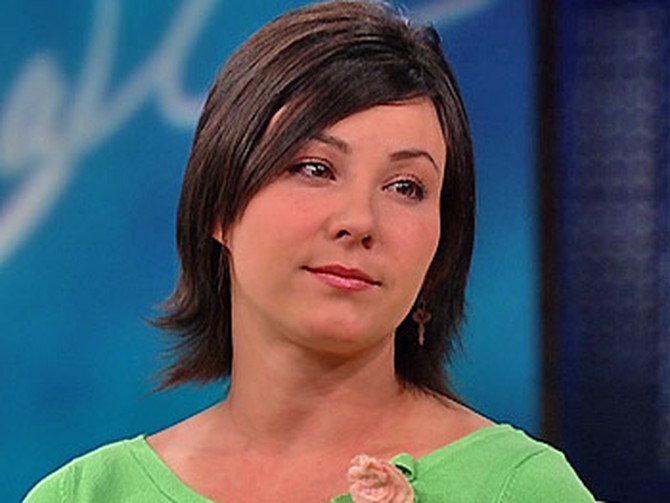
Like millions of people, Tamela suffers from a secret compulsion to self-mutilate, cutting herself and smearing the blood over her body. And, like an estimated half of those who cut themselves, Tamela was molested as a child. Though her parents sought help for her when she was younger, it was not enough, and she continued to suffer psychological trauma, seeking release in her dangerous addiction.
Tamela, in trying to explain why she would harm herself, said, "Sometimes I don't even feel. I'll cut myself just so I can be, like, am I alive? I don't feel anything. I'm not happy. I'm not sad. I feel nothing. I like to see something that's pure become corrupted and then just see the blood staining it, especially if it's my own blood. I'm just thinking about the blood and how good I'm going to feel afterwards."
This became such a problem that family and friends, with help from Candy Flannigan of A&E's Intervention, confronted Tamela about her dangerous behavior.
Tamela, in trying to explain why she would harm herself, said, "Sometimes I don't even feel. I'll cut myself just so I can be, like, am I alive? I don't feel anything. I'm not happy. I'm not sad. I feel nothing. I like to see something that's pure become corrupted and then just see the blood staining it, especially if it's my own blood. I'm just thinking about the blood and how good I'm going to feel afterwards."
This became such a problem that family and friends, with help from Candy Flannigan of A&E's Intervention, confronted Tamela about her dangerous behavior.
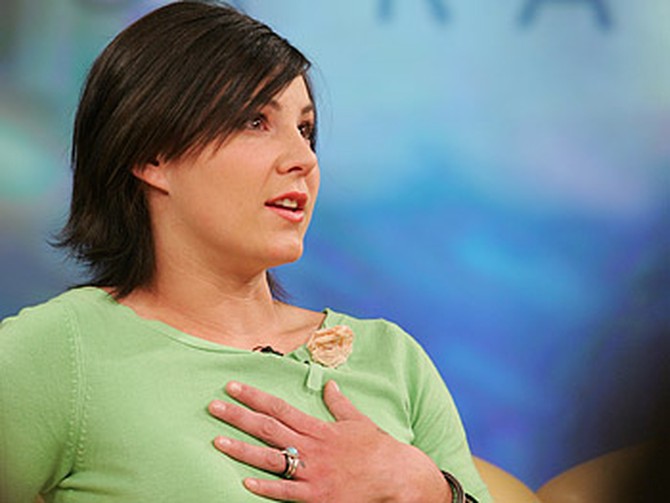
Now, Tamela reports that she has gone six months without cutting herself. She says the intervention itself helped change her. "I had no idea how many people supported me and loved me, because I had no value of myself so I couldn't see the love in other people," she says. "And when I was confronted by my family and friends, I was blown away about how much I impacted their lives and how much I meant to them."
Tamela reflected on her history of violent self-mutilation. She says that, though she had experimented with cutting when she was younger, she began doing it more frequently when she began seeing her now ex-boyfriend, Rod. "My value, my self-esteem just went the lowest that it's ever been, and I didn't know what to do with all these feelings," she says. "I was feeling so intense I didn't know how to express that."
The psychological treatment Tamela received after her intervention has allowed her to deal with her feelings about her molestation, which have alleviated her desire to cut herself. "I lost a lot of respect for men, you know, just because after I got molested, I had relationships that didn't mean anything," she says. "They were just purely sexual or purely for attention. So I would seek out guys that would give me that kind of attention. So the men that I saw, of course I had little respect for them and the way they acted."
Tamela reflected on her history of violent self-mutilation. She says that, though she had experimented with cutting when she was younger, she began doing it more frequently when she began seeing her now ex-boyfriend, Rod. "My value, my self-esteem just went the lowest that it's ever been, and I didn't know what to do with all these feelings," she says. "I was feeling so intense I didn't know how to express that."
The psychological treatment Tamela received after her intervention has allowed her to deal with her feelings about her molestation, which have alleviated her desire to cut herself. "I lost a lot of respect for men, you know, just because after I got molested, I had relationships that didn't mean anything," she says. "They were just purely sexual or purely for attention. So I would seek out guys that would give me that kind of attention. So the men that I saw, of course I had little respect for them and the way they acted."
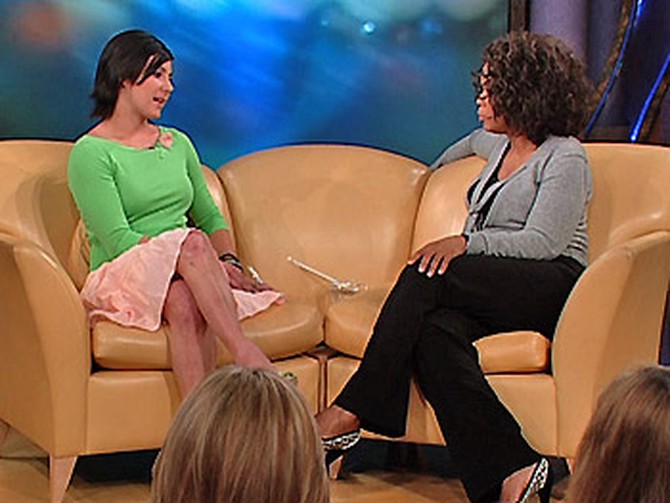
Oprah: As I was watching the tape, and I know lots of people were flinching watching the tape [of Tamela cutting herself] and it's very uncomfortable to watch… I've said before I've had almost every experience. But I do not understand the cutting. Is it to feel the pain? You want to feel pain or you don't feel pain? What is it?
Tamela: It actually varies every time that I did it. But mostly the feelings inside that I have are so intense and so overwhelming I don't know how to express them. And sometimes I would just be in so much [emotional] pain that I would cut myself. And usually I didn't feel pain. I didn't feel anything.
Oprah: You'd cut yourself, you'd see the blood, and what?
Tamela: It was about the blood. It was about seeing that I exist. I'm alive because I see my own blood.
Oprah: And why would you then smear the blood everywhere?
Tamela: Well that was obviously a ritual. I would like to take white items and I'd like to make them impure. I felt dirty and I felt unclean just from my past.
Tamela: It actually varies every time that I did it. But mostly the feelings inside that I have are so intense and so overwhelming I don't know how to express them. And sometimes I would just be in so much [emotional] pain that I would cut myself. And usually I didn't feel pain. I didn't feel anything.
Oprah: You'd cut yourself, you'd see the blood, and what?
Tamela: It was about the blood. It was about seeing that I exist. I'm alive because I see my own blood.
Oprah: And why would you then smear the blood everywhere?
Tamela: Well that was obviously a ritual. I would like to take white items and I'd like to make them impure. I felt dirty and I felt unclean just from my past.
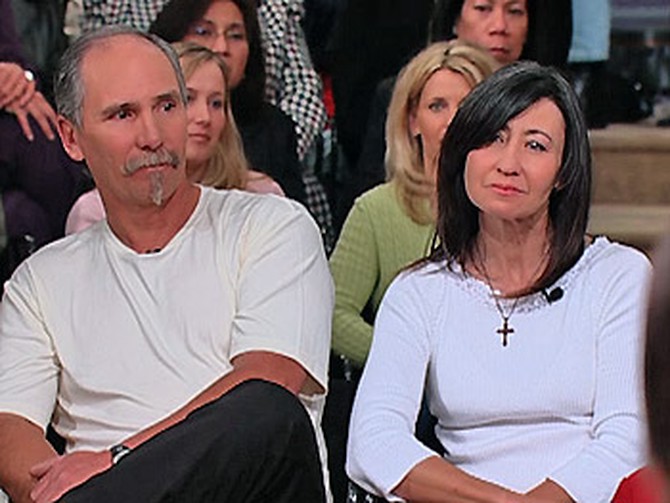
Tamela's parents, Steve and Susie, admit that they struggled to deal with their daughter's sexual abuse but they thought that she would be okay. "I immediately took her to counseling, you know," Susie says. "Of course we talked to the family. But something like this—I was numb, in shock. I had no idea what to do, what to say. I didn't know how to comfort her. … I'm a Christian and I believe in God but I didn't know how to comfort my own daughter."
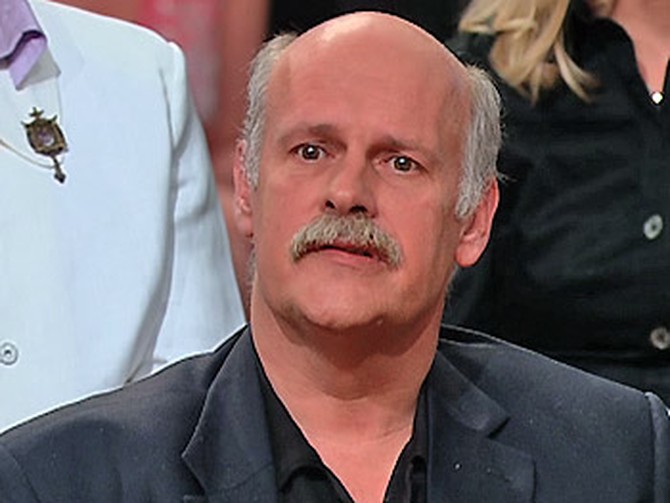
Jeff VanVonderen, an expert on the nature of substance abuse who helped Alyson on A&E's Intervention, says families of addicts like Alyson and Tamela often act as enablers. This happens, he says, even as they have nothing but good intentions, trying to protect a suffering loved one.
"They think they're really helping," he says. "They're not trying to hurt the situation. But typically, … when they're watching what's going on, it's not okay in their heart, and in their head it's not okay. … So what they do, in terms of the relationship with the person, is they help the problem continue even though they're trying to help it to stop. So continuing to say the same thing over and over again, that doesn't help. But it does help [the addiction] go one more day and one more day and one more day."
Jeff, also the author of Good News for the Chemically Dependent and Those Who Love Them, suggests a simple question families can ask themselves to determine if they are enabling destructive behavior in a loved one. "Am I helping something happen that I agree with, or am I helping something happen I don't agree with?"
"They think they're really helping," he says. "They're not trying to hurt the situation. But typically, … when they're watching what's going on, it's not okay in their heart, and in their head it's not okay. … So what they do, in terms of the relationship with the person, is they help the problem continue even though they're trying to help it to stop. So continuing to say the same thing over and over again, that doesn't help. But it does help [the addiction] go one more day and one more day and one more day."
Jeff, also the author of Good News for the Chemically Dependent and Those Who Love Them, suggests a simple question families can ask themselves to determine if they are enabling destructive behavior in a loved one. "Am I helping something happen that I agree with, or am I helping something happen I don't agree with?"
Published 04/26/2005

